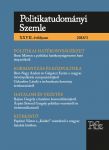A magyar törvények és az Európai Unió (2006-2014)
The Brussels effect. Hungarian laws and the European Union (2006–2014)
Author(s): Beáta Biró-Nink, Eszter GalgócziSubject(s): International Law, EU-Legislation
Published by: MTA Politikai Tudományi Intézete
Keywords: European integration; Europeanization; public policy; law-making; legislative studies; Euroscepticism
Summary/Abstract: This paper examines the policy aspects of Europeanization in the Hungarian Parliament. By analyzing all laws adopted in the Hungarian Parliament between 2006 and 2014, we demonstrate the extent to which Eu level policy decisions and recommendations have influenced law-making in Hungary. The comparison of the 2006–2010 and 2010–2014 parliamentary terms shows that the changes in governmental attitudes towards the European union are not reflected in the law-making of the Hungarian Parliament. The Hungarian case suggests that there might be a gap between Eurosceptic rhetoric and legislative actions, as there is very little difference between the pro-Eu socialist governments of 2006-2010 and the Eurosceptic orbán government of 2010–2014 in terms of the proportion of laws of European origin that are adopted in parliament (36 and 34 percent, respectively). Moreover, the Europeanization of law-making has not been limited to the transposition of legally binding Eu acts: the proportion of proactively adopted Europeanized laws did not decrease under the orbán government, and even in those policy areas where the Eu exercises only supporting competences, the influence of Eu level decisions and recommendations did not decrease between 2006-2010 and 2010-2014. The length of the legislative process for Europeanized laws was always longer during the two terms than the number of days required to pass other laws, but this difference further increased under the orbán government (while the general speed of law-making was significantly faster after 2010). It can be concluded that the Europeanization of Hungarian public policy did not stop after orbán and his Fidesz party came to power in 2010, and regardless of the governments’ attitudes towards the Eu, adaptation to the European public policy context also exists in those policy areas where it is not compulsory.
Journal: Politikatudományi Szemle
- Issue Year: XXVII/2018
- Issue No: 3
- Page Range: 35-57
- Page Count: 23
- Language: Hungarian

